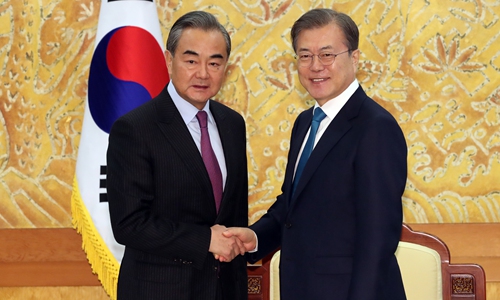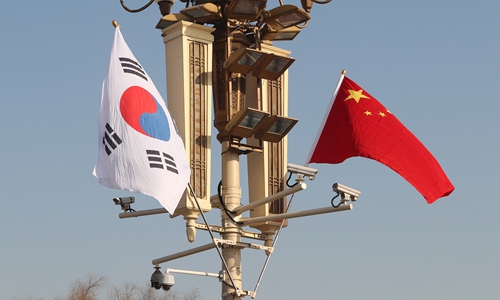HOME >> CHINA
Wang’s visit a sign that two countries walk out of THAAD shadows: expert
By Leng Shumei Source:Global Times Published: 2019/12/5 23:03:40 Last Updated: 2019/12/5 23:29:32

Chinese State Councilor and Foreign Minister Wang Yi (left) shakes hands with South Korean President Moon Jae-in on Thursday. Photo: IC
China and South Korea vowed to strengthen cooperation and safeguard free trade on Thursday in Seoul, which Chinese experts took as a sign that the two countries would walk out of the shadows of the US deployment of Terminal High Altitude Area Defense (THAAD) in South Korea.
The agreement was reached during a meeting between Chinese State Councilor and Foreign Minister Wang Yi and South Korean President Moon Jae-in on Thursday.
"Unilateralism and power politics are threatening global and regional peace and stability," Wang said at the meeting.
"As close neighbors, it is necessary that China and South Korea enhance communication and cooperation to safeguard multilateralism, free trade and adhere to basic principles of international relations."
Moon noted he looked forward to the upcoming meeting between Chinese, Japanese and South Korean leaders to further deepen bilateral dialogue and cooperation. As the process of denuclearization and permanent peace for the Korean Peninsula is at a vital point, close communication between China and South Korea will benefit the safety and stability of the Northeast Asia region, Moon said, the Yonhap News Agency reported.
China is willing to keep close communication on high-level exchanges, to connect the Belt and Road Initiative with South Korea's development plans and to accelerate the second phase of negotiation on China-South Korean free trade agreement, Wang said, according to the Ministry of Foreign Affairs website.
Wang also called for signing of the Regional Comprehensive Economic Partnership in 2020 and acceleration of the establishment of the China-Japan-South Korean free trade zone.

Photo:VCG
The two sides also exchanged views on the Korean Peninsula issues.
Experts from China and South Korea expected Wang's visit to raise bilateral exchanges to a high level and help the two sides walk out of the shadows following South Korea's decision to deploy the THAAD system in 2016.
Lü Chao, a research fellow at the Liaoning Academy of Social Sciences, said that both sides expressed strong willingness to restore relations given the ongoing trade frictions between China and US and frictions between South Korea and Japan.
"China hopes the Northeast Asian region can huddle together for warmth amid a bad global economic situation," Lü told the Global Times.
Citing an anonymous South Korean official, the Yonhap News Agency reported Seoul indicated the willingness to invite President Xi Jinping for a visit to South Korea as soon as possible during Wang's meeting with his South Korean counterpart Kang kyung-wha Wednesday.
The visit could be arranged in the first half of 2020, Yonhap reported.
Xi's visit, if realized, will mark full normalization of Chinese-South Korean ties, Kim Jin-ho, a professor of international relations at South Korea's Dankook University, told the Global Times.
Newspaper headline: China, South Korea deepen cooperation
Posted in: DIPLOMACY